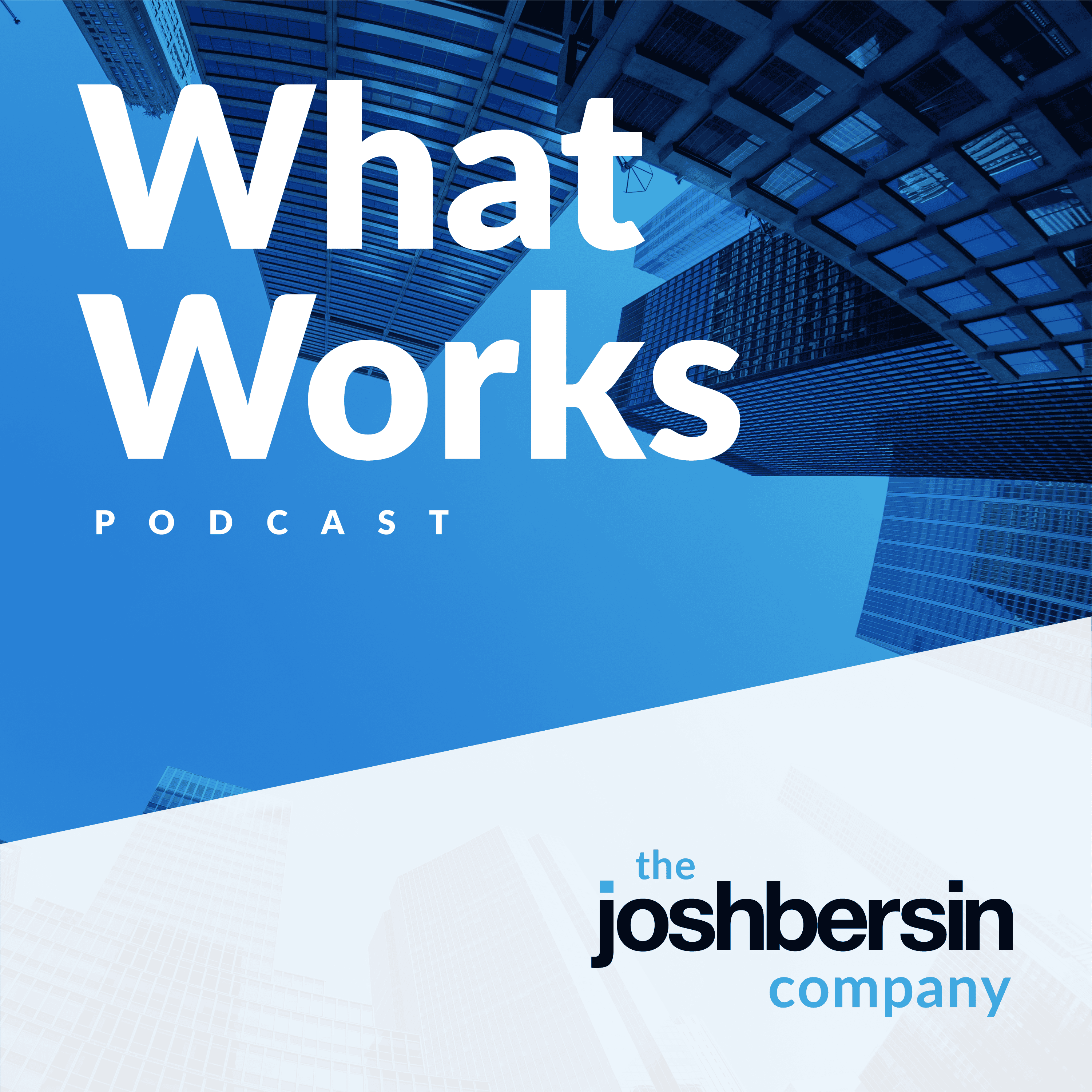Episode Transcript
[00:00:00] Hey, today I want to talk briefly about the acquisition of smart recruiters by SuccessFactors. So smart recruiters was a startup funded by Jerome Ternick. Jerome is one of the most successful, interesting entrepreneurs I've ever met. I've spent a lot of time with him over the years. This is, I think, the third company he's created and sold. Of course, Smart Recruiters is in the talent acquisition space, but they've always focused on more than just applicant tracking. They really did early on envision their platform as an end to end hiring platform. In other words, selection, assessment, recruiting, applicant tracking, process management, onboarding, the whole thing. And when he started the company, it was originally free because it was a cloud based system. And he wanted to build a completely open platform that can plug into lots and lots of assessment and interviewing and different tools. And that was actually the reason the company was so successful is it was extremely open, designed to be interoperable, very easy to use, very easy to implement, and of course because it was free, a lot of companies used it. And very quickly, very quickly, Jerome realized that the real revenue opportunity was in the larger companies. And as they started to price the product out, they went after bigger deals and they focused on enterprise features. And I've met with them multiple times over the years and they built a very interesting framework for end to end hiring, focused on the quality of hire and the quality of the hiring experience to candidates. And START started to really develop some very large implementations. I believe Siemens or one of the German manufacturing companies was one of their largest accounts and there were others. And Jerome has been doing this a long time. So at some point he decided to bring in Rebecca Carr, who's a seasoned executive, and he stepped away and Rebecca continued to grow the company until this week, the announcement of the acquisition by SAP. I talked to Dan Beck, the president of SuccessFactors, very briefly and we talked about it and they're very excited. They'll give us more details as they deal gets further along. But what does this mean? So there's a couple of, you know, messages in all this. Number one, the talent acquisition part of HR is extremely important because this is where you source the talent that you manage. And if you don't source the right people on a regular basis and hire them, you can't manage them well and grow your company. So whether you're Mark Zuckerberg trying to hire AI gurus away from OpenAI or you're just a sales manager trying to hire a great sales rep or whatever it may be, that hiring process is the most important thing you do in your company because if you don't hire the right people or the best people, everything else falls apart. And as you know, there's many complexities to hiring. There's technical fit, culture fit, role level, skills, experience, relationships, connections, et cetera. And even when the economy is in recession, hiring continues. There's all always hiring going on in companies. You know, roughly 20 to 30 million or more people are hired in downturns. 40 to 50 million people are hired during normal times. In the United States, almost 25% of the workforce turns over every single year. It's in the 20s, sometimes goes up, sometimes goes down. So there's lots and lots of hiring going on all the time. And therefore it's a very attractive market for software companies. And many entrepreneurs have taken it upon themselves to try to decide to reinvent all this. And they usually realize, unfortunately, that it's very complicated and a very, very competitive space. So the talent acquisition vendors that have come and gone over the years have learned that you have to be enormously focused, very good at sales and marketing, and pick your target segments and what types of companies you want to go after. High volume hiring for McDonald's or FedEx is very different from white collar hiring for Barclays or JPMorgan. Ch.
[00:04:09] Large companies have very complex hiring needs that are very process and workflow based. Small companies need something cheap and easy. I mean, anyway, I won't go through all the vendors that have come and gone in this space, but there's dozens and dozens and dozens. And today some of the vendors that I've worked with for years are struggling because more and more of this is going to be done agentically. And the agent oriented or agent based recruiting platforms have much more of an end to end architecture than the traditional applicant tracking systems.
[00:04:38] So it's going to be, you know, continue to be competitive. Now for SAP, this is great. They get a great engineering team, they get a lot of new customers, they have a very mature product. I don't know what the relationship is between this product and their current one, but I'm sure they'll work that out. Of course they get expertise in AI, expertise in sourcing lots of partners. Many, many good things come from this. And you could really kind of see this exact effect going on a year or so ago when Workday acquired Hired Score. Although Hired Score was a more limited product, it didn't have the features of smart recruiters. But let me sort of go beyond that, which is that while applicant tracking is the name of the category and that's this historic position of it because of AI, because of the way businesses operate today, hiring does not stand alone anymore. Most companies have a dedicated talent acquisition team or person. But more and more of that operation is going into what we call systemic hr. Because as the company reorganizes or downsizes or does productivity and job and work re engineering initiatives around AI, there's a lot of internal mobility. And ideally the talent acquisition function should be managing that as well as internal hiring from the outside.
[00:05:54] So, you know, the days of the coe of recruiting are slowly coming to an end, very slowly. And that group of people and that expertise is going to be much more integrated into the ongoing operations of the company. That's not to say that applicant tracking is going to go away. It's not, because it's going to continue. But we have to make sure that we think about these systems as an integrated part of our operating model, not an outsourced little group that goes out and finds people. And this comes up in all the meetings we're having, every single one. When people talk about AI transformation, because that is the top theme in every organization we talk to how do we implement AI to improve productivity, reduce cost, reduce headcount, et cetera. And when you do that, you analyze jobs, you combine jobs, you reduce middle management, you rethink the go to market strategy and the customer experience, you rethink the employee experience and you realize that you need maybe different people in different jobs and you might have to hire people you don't have, or you might have to redeploy people from their current jobs. So who handles that process? Well, honestly, in some of the more advanced companies I've talked to, the talent acquisition expertise is the best group of people to do that because they understand the fit between role and individual and they understand job architecture. You know, the biggest thing that I believe is holding back AI transformation isn't AI, it's job architecture. We have in companies very convoluted, confused, sometimes bureaucratic job architectures. And when we want to redesign the way we do things, redesign work, redesign business processes, we have to move people to new jobs and create new jobs. And I like to think of them as roles, not jobs, because they change all the time. And a job has too much of a permanent sort of legacy definition. And we had, we have about 30 or 40 companies we're working with right now on a job and work re engineering cohort. And this has come up in every organization that the problem of AI transformation is not just the redesign of work on a whiteboard but the redesign of the jobs and the people doing those jobs and the skills they need to transform the way the company wants to transform. A lot of that has to do with fitting people to the skills and capabilities needed in these new AI roles, which are obviously much more empowered and much more powerful because of the super worker effect. And a lot of that has to do with the kinds of things that talent acquisition people do. Understand the role, understand the needs of the team, understand the fit, understand the experience needed, understand the skills needed. So SAP knows this, and when I talked to Dan, we chatted about it, that this is not just an acquisition of a tech company to make successfactor a better or bigger platform, but it's also to help SAP further think through the more integrated, systemic approach to management and HR that really drives where companies are going.
[00:08:56] We have a big announcement coming with SAP in October.
[00:09:00] I'm not going to tell you what it is now, but stay tuned for that. And I just want to also really celebrate Jerome. You know, I've met a lot of entrepreneurs. I've been an entrepreneur for almost 30 years myself. It's hard. It takes focus, it takes energy, it takes passion, it takes intelligence, takes hard work, it takes grit, takes creativity, it takes empathy. There's a lot of skills that entrepreneurs need to have and Jerome has these skills. And so I want to just celebrate his success here. And hopefully there's a lot for everybody to learn from this experience. And those of you in the SAP world, you'll get a chance to see what this technology is like. Bye for now.


